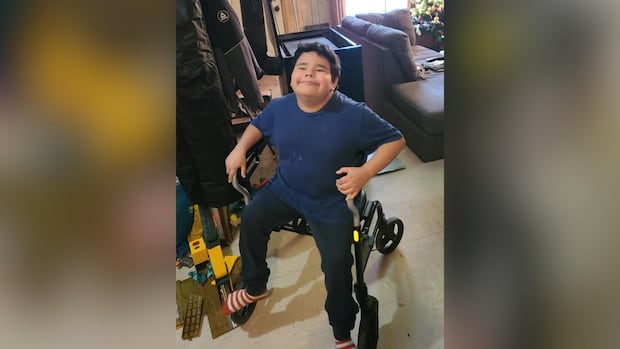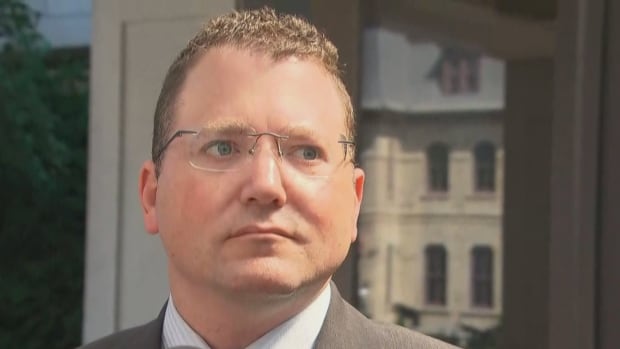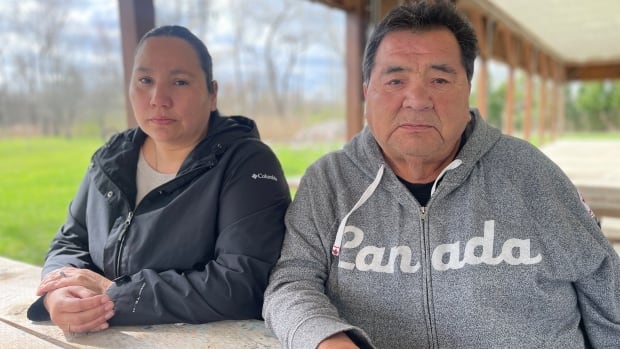The family of a seven-year-old boy from Deer Lake First Nation who was denied medical transportation coverage because he didn’t yet have an Indian status card is calling for changes to Ottawa’s Non-Insured Health Benefits (NIHB) program.
Jordan Harper was seriously injured, and his grandmother died, in January in a head-on collision with another vehicle on the winter road near the northwestern Ontario community. The Grade 2 student was airlifted to the Hamilton Health Sciences Centre, where two metal rods were put in his leg.
Last month, Jordan was supposed to have the rods removed, but his family was waiting for NIHB staff to book a scheduled medical evacuation from Deer Lake to Thunder Bay.
“His leg was all swollen from the rods,” said Aretta Meekis, who described her stepson as smart and outgoing.
The family said they were told Jordan wasn’t covered under NIHB because he didn’t have an Indian status card, something his late grandmother — who was his primary caregiver — had been trying to get him.
“I was just crying that one day because they refused — they still refused the medevac and he was just in pain,” his stepmom said. “He just turned seven, like, how can you refuse a child?”
About 1,100 people live in Deer Lake, a remote community that can only be accessed by plane or winter road.
After waiting more than a week to get him out of the community, the Oji-Cree First Nation’s tribal council, Keewaytinook Okimakanak, paid to send him to Thunder Bay for the rod-removal surgery.
“We’re hearing stories like that all over — community chiefs paying for things, health directors paying for things,” said Monica Hemeon, vice-president of regional services for the Sioux Lookout First Nations Health Authority (SLFNHA).
SLFNHA provides health services to 33 First Nations — 28 of them are remote.
We’re hearing stories like that all over — community chiefs paying for things, health directors paying for things.– Monica Hemeon, SLFNHA
The NIHB program provides coverage to First Nations and Inuit people across Canada for a number of health benefits that aren’t already covered under social programs, private insurance plans, or provincial or territorial health insurance.
This includes medical transportation to access services that aren’t available in their communities.
In order to qualify, clients must live in Canada and be at least one of the following:
- A First Nations person registered under the Indian Act — known as a status Indian.
- An Inuk recognized by an Inuit land claim organization.
- A child under two years old whose parent is eligible under the NIHB.
Jordan’s stepmom questions why, considering the urgency of the care Jordan needed, an exception couldn’t be made while his family finished completing his status Indian card application. The process is still in the works — the family’s efforts to get him the card were delayed as they dealt with the accident.
A spokesperson for Indigenous Services Canada (ISC) told CBC in an email that it “is working diligently to improve NIHB medical transportation services in the Sioux Lookout area.”
Jordan’s family, however, said the change can’t come quickly enough.
Miscommunications, missed appointments
Brad Meekis is a band councillor for Deer Lake First Nation who oversees the health portfolio in his community. He said miscommunications between NIHB staff and Deer Lake’s nursing station regularly result in travel not being booked and appointments being cancelled.
“Once the referrals are made to NIHB, they say that they don’t receive the referrals from our nursing station.
“Some of our people miss critical appointments like this. Sometimes they wait numerous years before they’re seen again.”
Amanda Meekis, who works at Deer Lake’s nursing station, is responsible for managing medical travel requests and sending referrals to NIHB staff, which involves a lot of paperwork and advocacy for community members. She said she often spends hours on hold with NIHB employees and sometimes has negative interactions with them.
“Sometimes, they just hang up on me.”
She said NIHB staff often ask her detailed questions about the reasons clients need medical transportation, but she can’t disclose that information due to patient confidentiality.
Some of our people miss critical appointments like this. Sometimes they wait numerous years before they’re seen again.– Brad Meekis, Deer Lake First Nation band councillor
When people from remote communities miss appointments, “the impact potentially is catastrophic,” said Hemeon.
“If someone’s meant to go out to see a specialist, and they’re getting diagnosed with something at that appointment and they miss that appointment, that diagnosis now is pushed.”
ISC boosts staffing to increase capacity
Jennifer Cooper, a spokesperson for ISC, said in an email that an initial meeting was held between the department and SLFNHA in July “to discuss their concerns about the NIHB program.”
Since then, a number of meetings have taken place, and ISC said several steps have been taken “to resolve the challenges raised and increase capacity at the Sioux Lookout office.” These include:
- Boosting staffing numbers, for a total of 20 employees at the Sioux Lookout NIHB office, to provide additional phone support to reduce wait times.
- The creation of a new senior manager position to lead the team and manage capacity.
“ISC is also adjusting internal processes and governance structures, and streamlining forms and documentation to improve our ability to respond to medical transportation requests,” Cooper said.
A bilateral table was also established with SLFNHA “to support regular discussion of gaps and challenges, and actions that can be taken to improve NIHB operations in the Sioux Lookout region.”
Need for more support in urban centres
When clients don’t show up to appointments, health-care providers become more reluctant in scheduling followups, said Hemeon, even when the situation was beyond their control — like travel not being booked or a plane being cancelled due to inclement weather.
Beyond getting people out of their communities for care, Hemeon said, there’s a need for more support once they arrive.
SLFNHA operates three hostels in Sioux Lookout to accommodate people who’ve travelled there for medical appointments. The organization also offers transportation, translators, patient navigators and other support.

“It’s when they have to leave Sioux Lookout that the client tends to have a little bit more trouble navigating the health-care system, especially in bigger urban centres like Thunder Bay, Winnipeg and Toronto,” said Hemeon.
Oftentimes, NIHB staff don’t reserve accommodations in advance, and patients who don’t have credit cards have problems booking taxis and hotel rooms, she said.
SLFNHA is looking at expanding its presence in these urban centres; it’s already introduced a transportation program in Thunder Bay.
However, “we have received a very negative response from Indigenous Services Canada and NIHB specifically regarding our desire to move out and into these urban city centres to support our clients more,” Hemeon said.

Back in Deer Lake, Jordan is feeling a lot better, said Aretta Meekis.
“He’s so happy he can move around freely,” she said. “They did such a great job on his leg. He’s so happy with the nurses and the doctors.”
Jordan has a followup appointment coming up in Thunder Bay. When CBC spoke with Aretta Meekis, she wasn’t sure how that trip would be covered.
Her hope is Jordan’s story informs others about the challenges people in remote communities face in getting care and that other families don’t go through similar situations.






